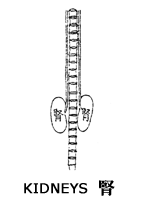 Kidneys from a TCM Perspective Kidneys from a TCM Perspective
In western physiology, the kidneys are a vital excretory organ whose main function is to create urine to help the body get rid of toxins and unwanted water. TCM practitioners view the kidneys as a very important organ that not only regulates the urinary system but also exercises control over the reproductive, endocrine and nervous systems.
"The kidneys store Jing"
In TCM, Jing is an essential substance, closely associated with life. It is the substance needed for reproduction, growth development and maturation. The kidneys are the organs responsible for human development, because they store Jing. For example, conception is made possible by the power of Jing, growth to maturity is the blossoming of Jing, and aging reflects the weakening of Jing. As time passes, Jing decreases, causing both vitality and kidney qi to decline. This decline is the normal aging process.
"The kidneys rule water."
The kidneys rule water by regulating its distribution and excretion, traditionally described as the vaporizing power of the kidneys. The kidneys can differentiate between clean water, which is recycled and used by the body, from turbid water that is turned into urine. The separation of these two is the vaporization process.
The kidneys play an important role in water movement and balance of the whole body. Fluids and food are received by the stomach where separation begins. The unusable portions of food and fluid are sent to the intestines as waste where pure fluids (mainly water) are extracted from them. The pure fluids go to the spleen, which then sends them in a vaporized state upward to the lungs. The lungs circulate and disseminate the clear part of the fluids throughout the body. Whatever has become impure through use is liquefied by the lungs and sent downward to the kidneys. In the kidneys, the impure fluids are further separated into "clean" and "turbid" parts. The clean part is vaporized into a mist and sent upwards to the lungs, where it rejoins the cycle. The final impure portion goes to the bladder, where it is stored and finally excreted as urine.
"The kidneys rule the grasping of qi."
Although respiratory functions mainly depend on the lungs, deep and normal breathing is controlled by the "grasping" function of the kidneys. By grasping qi, the kidneys enable the "natural air qi" of the lungs to penetrate deeply during the inhalation process. If there is kidney disharmony, respiratory problems such as shallow breathing or wheezing on exertion can occur. Some types of asthma are related to disordered grasping of qi by the kidneys. "The kidneys rule the bones and produce bone marrow.
The kidneys manifest in the head hair."
Stored in the kidneys, Jing is the substance responsible for producing bone marrow, which in turn, creates and supports bone growth. Therefore, bone development and repair depends on the nourishment of kidney Jing. Deficiency of Jing in children can lead to soft bones or incomplete closure of the skull bones. Teeth are made up of bone so dental problems can also indicate a kidney deficiency.
Head hair depends on blood for its nourishment. The kidneys play a role in transforming stored Jing into blood. If Jing and blood are abundant, the hair will appear bright, shiny and healthy. On the other hand, hair loss or other hair disorders can indicate a kidney deficiency or blood deficiency.
"The kidneys open into the ears and genital organs."
Good hearing comes with abundant kidney Jing, while a deficiency causes hearing problems like deafness or ringing in the ears (tinnitus). Genital and urinary tract disorders such as urinary frequency or dripping urine (incontinence) are also signs of kidney disharmony.
Click here to read more about the Kidney Meridian. |